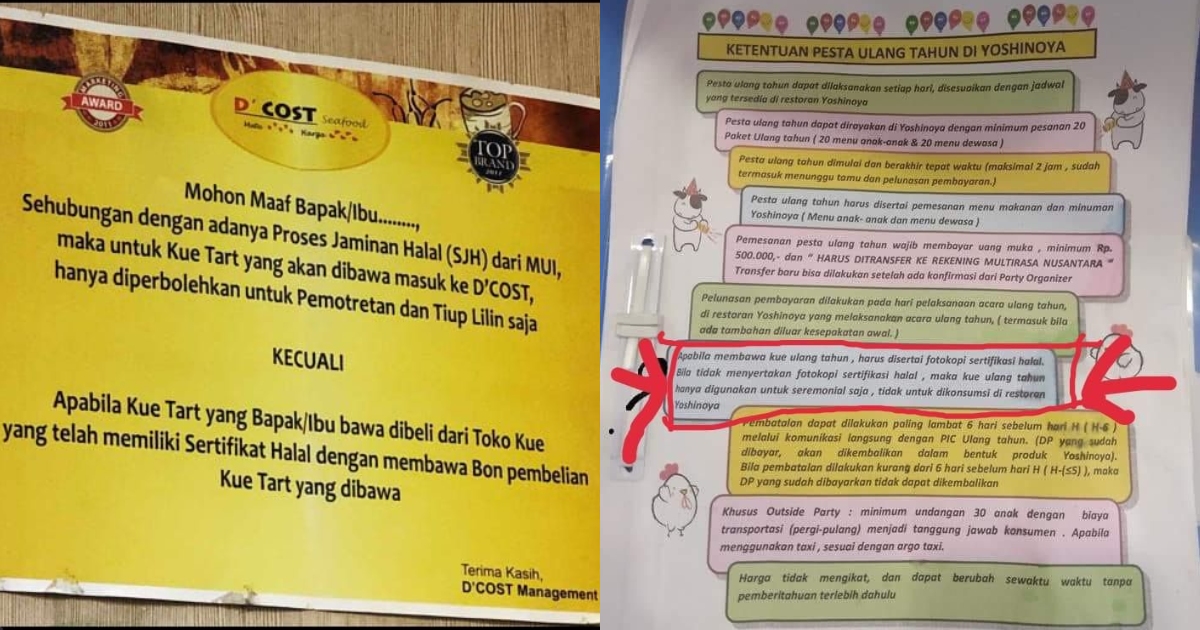Japanese beef bowl chain Yoshinoya and Indonesian seafood chain D’Cost have both found themselves in the middle of what might be (yet) another religious discrimination scandal in Indonesia. Once again, it has to do with birthday cakes.
Photos of a sign at one D’Cost restaurant and what appears to be a birthday party regulation from a Yoshinoya restaurant have gone viral recently. Both essentially say that patrons are allowed to bring in birthday cakes from outside bakeries, but only cakes that are certified halal (permissible for consumption by Muslims) can be consumed inside the restaurants.
Cakes that aren’t halal-certified can only be brought in for ceremonial purposes, such as candle blowing and taking photos.
D’Cost’s sign says that the policy is to ensure that the chain upholds its halal guarantee from the Indonesian Ulema Council (MUI), the country’s highest clerical body that has long held sole authority in providing halal certifications in Indonesia.
D’Cost and Yoshinoya have been certified halal since 2012 and 2014, respectively. The two restaurants have responded to the accusations of religious discrimination after their signs went viral.
“It’s true, the regulation was actually made to uphold the halal guarantee. Customers who bring birthday cakes will be asked about where the cake is from. If it’s guaranteed to be halal, we will provide them with plates, knives, and spoons for them to eat the cake. If not, they can’t eat [the cake in store],” Teddy, a manager from a D’Cost restaurant in Central Jakarta, told Detik today, adding that the regulation is not actually new.
Sudan, a marketing representative from a Yoshinoya store in South Jakarta, also told Detik today that the regulation is based on MUI’s regulations on halal guarantees.
“It’s not really a prohibition, so if [the customer] want to celebrate their birthdays at Yoshinoya, we suggest them to bring birthday cakes from halal-certified bakeries. They need to present a copy of the halal certification, or a photo of it will suffice,” he said.
“If they bring their non-halal certified birthday cakes, it’s alright, but we’ll inform them that it will only be allowed for ceremonial purposes only. They can hand out the cake, but it’s not allowed for in-store consumption.”
One guarantee that halal-certified restaurants in Indonesia must uphold is that their dishes and cutlery are not tainted with non-halal products. As such, public reaction to the non-halal cake ban has been divided.
https://twitter.com/Sashakinar/status/1205415629236256768?s=20
What’s wrong with the ban? Yoshinoya is halal-certified. If someone brings in non-halal cake containing rum or Baileys, using Yoshinoya’s cutlery, then they will be contaminated by the non-halal product.
https://twitter.com/Kana59060567/status/1205414677942898688?s=20
So is Islam the only religion that exists in Indonesia? Are minorities going to be continuously ignored?
This latest controversy came only weeks after South Korean bakery chain Tous Les Jours received public backlash for a rule on one of its stores in South Jakarta that many felt was discriminatory. A sign at the store conveyed to customers that it won’t write messages on cakes related to other religions’ holy days as well as greetings that violate Islamic sharia values in order to guarantee that its products are halal.





Reader Interactions